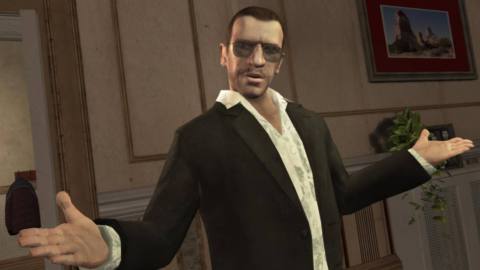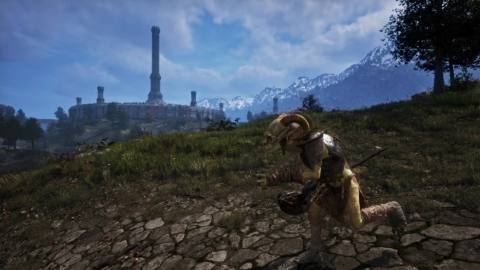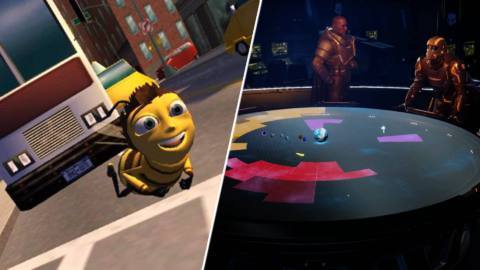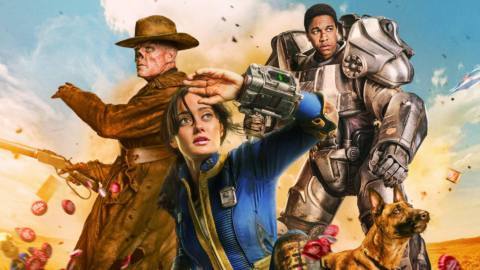We chat to IO Interactive about the end of Agent 47’s World of Assassination trilogy.
Agent 47 has been on a hell of a journey. Five years ago Hitman went through an episodic brand reboot under the stewardship of creator studio IO Interactive and long-time publisher Square Enix. By the second game, IO and 47 had parted ways with Square, landing instead at Warner Bros for a more traditional release. The final entry in the trilogy is self-published by a now completely independent IO. Few trilogies in video games have gone through such a tumultuous journey – leave alone doing so while thriving.
After going hands-on with the first couple of levels of Hitman 3, we had a chance to sit down with a couple of the team from IO Interactive – executive producer Forest Swartout Large and communications manager Travis Barbour. Here’s our chat in full:
VG247: How do you feel about the whole journey at the end of the trilogy? Lots has changed… format, release style, publisher… now you’re crossing a generation. So how do you feel about that whole journey now you’ve come to the end of it?
Forest Swartout Large: Ready for a vacation! [laughs]
Travis Barbour: It’s been massive, I think. Not only for the game, but also individually. Maybe this is too personal when we’re talking about the game, but it’s sort of been career-defining for me. Hitman 2016, that was the first game I saw from the very beginning. Absolution was pretty much done by the time I joined, but season 1 – as it was then, a season, which feels weird to say now… Season 1 was the very first game where I saw from the beginning, like, what that game could be. And now it feels like Hitman 3 is part of a big package, right?
I’m sure there’s so many individual stories, I’m sure… and on top of everything you listed, we also moved office! That was halfway through season 1. We’ve had two different publishers, three if you include ourselves on the last one – every game had a different publisher. There’s so many different things that just the fact that we got to the end with a really awesome game – a set of three games – is just… there’s stories to be told for years to come.
I think the overwhelming thing is feeling proud, though. I feel really proud of being part of it, of having the team create something that’s so cool, that so many people seem to like… and also that it put IO on the map a little bit. People knew Hitman, but they didn’t really know who made it. Maybe it wasn’t always the headlines we would’ve liked, but it also helped to really establish the company, which I think going forward is gonna be a really good thing.
Forest Swartout Large: It’s been pretty epic, yeah.

VG247: The changes that the game went through over this time are so interesting to me because… well, the release format, for instance – the way it was announced, you came in for a lot of criticism, but I think as people experienced the first season, they came around on it a bit. Then you tweaked and released all as one, but kept the live service aspect. Do you think that’s the future? Is that the future of IO, making these living games, even in single-player experiences like Hitman?
Travis Barbour: It could be, but not definitively. I don’t want to say that’s what we’re going to double down on and that’s it – I think it worked for what we wanted to do for Hitman. That basically came out of the back end of Absolution. I remember being at the Absolution E3s where we had the game designer at the time saying the way we made Absolution was that it was like a suitcase where you jam everything in, you pack it down – and then you manage to go on holiday, but you can’t fit anything else in the case. If you try to change something, the whole thing explodes and all your clothes go flying everywhere.
So we wanted to change from that learning how we make the game, so that we could add things on or keep it going. We ended up with the live model that we have now, but at the time, that was almost unheard of, especially for a single-player game, and in a game of the scale and getting the attention we got. Anyway, it depends on the game. It worked for Hitman; it fit the way we wanted to continue improving it. That’s not to say it’ll be the defacto model for us going forward.
Forest Swartout Large: It also allows us, from a development perspective, and a priorities perspective, to focus and say ‘this is what we want to do for our initial release, and then we want to add X, Y and Z features, or ABC targets’, or in Hitman 2 we added locations as well. So I think it’s been a gift of focus – it lets us not try to kitchen sink it, allows us to say this is what it is and isn’t at release, but it will evolve a little bit.
The gift also of the live service is that it’s allowed us to engage more with the fans and community, to really listen. We can tease things a little bit and see how that goes… but the magic really happens when you release the game and get the feedback, where you can then really see what’s working and what isn’t. Then you get one to two years to really iterate based on live feedback.
VG247: That leads into something else I wanted to ask. Hitman, and as a result of this trilogy, IO, is really known for systems. So what’s it like to have to iterate these systems over these three games? What’s impressive to me is that each feels quite significantly upgraded and different, even though they’re fundamentally the same.
Forest Swartout Large: Well, when we kick off the big projects – so when we kicked off Hitman 2 and 3 – we always do a step back and take a look at the basics. We really refresh ourselves with, okay, what are the basics. It’s creativity, it’s play, it’s high stealth, it’s high fantasy… Actually, we have this – we should maybe consider releasing it – our game director Mattias [Engstrom] did a talk on, like, these are the basics, this is how I see it. We start with that as our foundation.
Then we ask ourselves, what do we want to do on top of that? What do we want to add? What would be complementary? Then of course we have constraints like schedule, and budgets… This time around we’re self-publishing, so we were extra mindful about the budget and the timeline… but we always go back to the basics. We always remind ourselves what it really is about these games, and how we want it to be different to the previous iterations – what we can offer new, how we can surprise players.
Beyond that, we really wanted Hitman 3 to be an emotional journey. So we talked about what we want the players to feel mission-to-mission, and when the whole thing is complete. Other than satisfied!

VG247: I get the impression that you guys feel the backwards and forwards compatible nature of the trilogy has worked out, then? As that was something that was to an extent committed to all the way back in 2015. All these years on, do you feel that’s been worth all the effort? A big net plus?
Forest Swartout Large: Yes! There were few knowns when the trilogy was started. We knew it was three parts, and that it would be this epic ‘world of assassination’. [laughs] And we knew that it might span generations and new platforms, as well. We didn’t even know how we would finish the story when we started Hitman 2016, but we did know it was going to be a world – players would globetrot and have targets all over.
VG247: After the announcement, some people from IO described this entry as more serious and dark than the previous entries. But a lot of what has made this trilogy memorable, memeable, beloved, is the dumb stuff. So how do you balance that with telling the story you want to tell?
Travis Barbour: There’s a few things. The core elements of those zany or funny things – they’re still part of the core of the game. Dark humor is the phrase that we’ve used for all the titles, basically. What we’re trying to curb is the silliness or the complete, really zany stuff.
In Hitman 2, it sort of took us by surprise. The first trailer had somebody getting hit with a fish, and everybody went nuts for this fish. One of the things we’ve actually heard is that not everybody likes that style for Hitman and it doesn’t always fit. Some people are like ‘Not the fish!! Marketing guys, don’t do the fish again!’ It sort of took us by surprise that it caught on, and we sort of rode the train a little bit, just like ‘Okay! People love this fish, there’s also a flamingo!’
But also, not all of it was intentional. The whole thing with the briefcase – it was a bug! It wasn’t supposed to be that way. Nobody put it in there, it was some quirk tied to the frame rate of your PC or something. But then we saw it and were like, you know what, just keep it there. It doesn’t really make sense to patch it – it’ll take us time, and someone will have to fix it… we could just leave it for a little bit, and then we brought it back as a feature, as a bit of a joke. That was fun. That’s what I like about IO; it’s one of those IO moments where we embraced it, ran with it, and made something fresh out of it.
Back to Hitman 3, though… we have a sort of focus on the first time you play through a level. We want that to feel a little bit more handcrafted, a little bit more so you get a sense of the story. Afterwards, it opens up into complete freedom. That’s where you’ll more than likely find these weird and wacky things. They are still there – they’re just not quite being embraced in the same way.
The marketing has followed suit with that. We’re trying to depict the type of game it will be – but we also know it is fun, and it is what some people will like to see, and it can help us to extend its reach by people saying ‘you should play this game because you can do this funny thing,’ as well as the cool story, and the locations being awesome. So it’s not forgotten, but it’s not front and center as it was.

VG247: I think an overlooked aspect of these games is the writing. Like, the complexities of the writing work in these levels is just stunning to me. There’s depth for all sorts of eventualities, these aren’t necessarily linear stories… it’s very unconventional. How big is the writing team? Can you shed any light on how they approach these sandbox storytelling methods?
Forest Swartout Large: We have six writers on Hitman 3. I could say it about every discipline, though – our writers are magicians, so are our programmers, so are the designers, and so on…
It’s also the benefit of doing it for the third time. You have all of these writers who have worked on the two previous games. We have story, we have an ambient layer, we have in-game story, we have AI dialogue… It’s pretty major. Our dialogue budget as a proportion of the overall development budget is really high, because we have a lot of words, a lot of writing, a lot of recording, a lot of localization, a lot of QA… We pretty much have a dedicated producer as well who is pretty much full-time coordinating the writers, producing the recordings, and whatnot. It’s pretty monumental.
The fact that they both support linear story in the game as well as all these different outcomes and the sandbox in general – Hitman is a lot about giving the player the tools for creativity, experimentation, and play. It’s really amazing how the writers can sort of anticipate these outcomes. But then like Travis Barbour says, it’s also – there’s crazy things happening, it’s very emergent, and then all of a sudden there are these situations that nobody ever dreamed of, and it’s amazing! But, yeah. The writers are amazing; I bow to them.
Travis Barbour: The thing that always amazes me when we talk about that is it’s not only within the single game. If you really get into it, it’s all three games. If you remember, like, in the Paris level in Hitman 1, one of the NPCs there is a target in Hitman 2. She was at the auction, she was part of that whole storyline – and then they made her a target in Hitman 2. If you remember the tutorial from Hitman 1, the whole thing on the boat? That is ‘faked’, it’s a recreation of a past event, and you actually have characters in that mission who are parents to the targets in Sapienza, I think? Then you can learn more about her in Sapienza, because you take the flowers to her grave… it’s like, the whole thing is beyond insane, how it all flows if you get into the minutiae of how the characters, the plot, the organizations, and the corporations all link together.
It’s also something that I remember from the Absolution days. That was one of the core aims. Like, what if we make a Hitman game where we don’t kill everyone straight away? What if we have characters that can persist through a game, or two, or three. That sort of ambition of telling a bigger story and diving into a bigger world. Looking back on it, I think it’s something that we’ve definitely done.
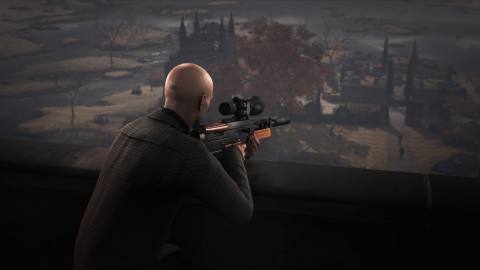
VG247: I know you guys can’t talk about your next projects in detail just yet, but I’m curious if there’s any over-arching lessons from the Hitman trilogy that you think IO is going to take into the future.
Forest Swartout Large: That is a tough question. But I think there’s something in, y’know, honesty and transparency. That’s also one of the benefits of being independent and going independent. We don’t have to have a bunch of PR people editing what we say! [laughs] We can just be very open, and vulnerable, and true.
I think that, actually, it’s good for the industry, it’s good for players, to hear about how the sausage is made. Sometimes it’s ugly or uncomfortable. Sometimes we’re operating in confusing spaces with lots of unknowns. So I would say it’s something related to listening to our fans, valuing that, and making time to do that diligently and constantly. But also, you never go wrong with being honest and open.
Travis Barbour: The first thing I sort of thought of was trusting your gut. Trusting your instinct. That’s something we’ve had to do a lot with Hitman 3. Especially going back to it being self-published – at least from the marketing point of view, and communications, there’s been a lot of things where we’ve… We’re a very small team. We have to make those decisions of what the first trailer should look like, and how long it should be. When should we reveal the locations? What things should we keep as spoilers?
We don’t have a dedicated PR person at IO – we have the awesome guys at Square helping us in Europe and other guys in the US – but in-house we’ve made a lot of the decisions about how to talk about the game, and what not to talk about, and how to talk about things, often without an external mirror initially. That’s obviously ramped up because we have awesome partners that have helped us, but the first things out of the gate were us. It worked – it went really well. So trusting our instincts, following them – that’s probably not new, but that’s what came to mind first for me. Having a collective direction and sticking with it makes a big difference.
The post Hitman Interview: IO Interactive on lessons learned, the future, and closing out the World of Assassination with a bang appeared first on VG247.

